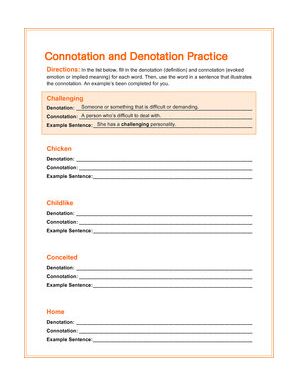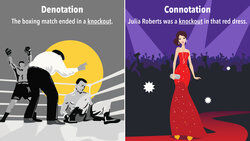

Has anyone ever asked you if you "catch their meaning"? If so, they were probably using a connotation. Denotation is more of a literal meaning. To keep them straight, learn the difference between connotation vs. denotation through definitions and examples.
What Is Denotation?
Denotation is the literal meaning of a word. For example, take the word "vintage." By its very definition, when you say that something is vintage, it means that it was made a long time ago. Perhaps your friend's dad drives a vintage Corvette. That's denotation.
A Look at Connotations
Connotation, on the other hand, is an indirect or implied meaning or feeling. Take the word "vintage" again. It has a separate connotation.
A lot of women love to shop for vintage clothing. That doesn't mean they're looking for something simply made a long time ago. In fact, popular brands make "vintage" clothing every day. It just means it's an old style that's making a comeback, such as headscarves or Mary Jane shoes. The word carries a nostalgic, desirable quality.
Still confused? Take a closer look at how connotation and denotation differ with an explanation and examples.
Connotation vs. Denotation
Here's another way to look at it. Denotation is the standard definition of a word, whereas connotation is the feeling evoked by a word. Let's consider another word: gritty.
The definition of gritty is "having a rough texture." So, in a literal sense (denotation), we might say:
This sandpaper is gritty. It'll make that countertop nice and smooth.
But, consider this sentence:
That side of town is pretty gritty.
In that sense, we're not saying that section of the city has a "rough texture" in a literal sense. Instead, we're saying it's a tough neighborhood, perhaps with issues related to crime and poverty. As such, you'll want to have your wits about you when walking through its streets. That's connotation.
Connotation and Denotation Examples
Now that you know the difference between the meanings of connotation vs. denotation, check out these examples of how you can use the same word in a denotative and connotative way.
Cheap: to cost very little
- Denotation: This shirt is cheap enough for me to afford.
- Connotation: That t-shirt was so cheap, it pilled in a matter of weeks.
The second sentence suggests that the t-shirt wasn't just a bargain buy. Rather, it was of poor quality. The implication is that a higher-quality garment wouldn't have pilled.
Dabble: to show a superficial interest
- Denotation: I dabble in painting.
- Connotation: You should never dabble in drugs.
When someone says you should never dabble in drugs (or anything harmful), they mean you shouldn't touch them, never mind a superficial interest or momentary experimentation. The connotation of "dabbling in drugs" is to "stay back." Don't even go there.
Innocent: free from guilt or wrongdoing
- Denotation: The court said she was innocent.
- Connotation: What does she know. She's so innocent.
In this context, the implication is that she's not just free from guilt; she's lacking in worldly knowledge or experience. She's naive. It carries a derogatory connotation, implying that the speaker has more "smarts" than the woman she's talking about.
Jabber: speak in quick, often nonsensical talk
- Denotation: The baby jabbers.
- Connotation: I thought he would never stop jabbering.
To wish someone would stop talking can mean anything. Perhaps you want quiet; maybe they're not letting you get a word in. But, saying that someone is jabbering carries the negative connotation of someone who's talking nonsensically and is starting to annoy you.
Knockout: a harsh blow that knocks someone unconscious
- Denotation: The boxing match ended in a knockout.
- Connotation: Julia Roberts was a knockout in that red dress.
This is a term for an extremely beautiful man or woman. It's supposed to conjure up images of people passing out at the sight of a stunner. Of course, this never actually happens, but the connotation is total enchantment.
Mutt: a mixed-breed dog
- Denotation: Since he is a mix of beagle and terrier, he's a mutt.
- Connotation: That mutt is always barking.
In this example, "mutt" carries a negative connotation. It's a term used in anger or frustration to reference an inferior, annoying dog. The implication is that, if the dog wasn't a mutt, it would be better behaved.
Pour: to flow freely or rain heavily
- Denotation: Do you want me to pour you a glass of water?
- Connotation: His work continued to pour in.
If anything is "pouring in," the connotation is that you can't keep up. When something drips or drops in, that carries a slow connotation. But, when something pours in, it's coming in at a rate that's too fast.
Twinkle: to shine with quick flashes of light
- Denotation: The stars twinkle in the sky.
- Connotation: There was a twinkle in her eye whenever she smiled.
To say someone twinkles when they smile or they have a twinkle in their eye connotes an element of positivity and goodness. If someone has a twinkle in their eye, they're usually thinking positive thoughts (and, perhaps, wanting to share them with you).
Wave: a swell of water
- Denotation: The wave crashes against the beach.
- Connotation: She grieved in waves of sadness.
Imagine an ocean wave literally crashing down on you. If you're not prepared, it's unpleasant. So, for anything in life to come upon you in waves, that means it's more than you're able to handle - until you find a way to swim to the proverbial shoreline and catch a breath.
Now that you've seen denotations and connotations in action, give this Connotation and Denotation Worksheet a try! If you need help with downloading or printing the PDF, refer to this guide for Adobe printables.

Feelings and Literal Meanings
Without question, words have meaning. That's why words can sometimes cause more damage than physical violence. To call someone "cheap" is quite different than saying they're "frugal" or "smart with money." These terms may all have the same literal meaning (denotation), but the connotation of each term is very different.
So, we must be careful not only in our speech but also in our prose. The descriptors you use for your characters, setting, and plot will tell readers what they need to know, so be sure to be precise. For more, enjoy these connotations in literature examples. Watch the pros insert subtle meaning into their prose through the gentle use of connotative words.